The Ultimate Skincare For Sensitive Skin
Skincare For Sensitive Skin, you yourself have sensitive skin or know someone who has sensitive skin. It is that skin that is constantly inflamed, red, itchy and looks completely unhappy.
I totally get it! Sensitive skin is no joke. Finding a skin care routine that works for you can be very frustrating, and sometimes it seems like you can’t get rid of that annoying feeling.
But don’t worry. We will be happy to assist you. In this post, we will share the ultimate skin care routine for sensitive skin so you can finally get the relief you deserve. This routine promises to leave your skin soft, supple, and free of irritation and redness. So what are you waiting for? Let’s start reading!
But What Is A Skincare For Sensitive Skin type?
- Do you have sensitive skin? If you are unsure, ask yourself the following questions:
- Do you think most skin care products irritate your skin?
- Do you need to be very careful with the products you use because even gentle ones can cause reactions?
- on your skin Do you often experience redness, itching, or burning?
If you answered yes to any of these questions, you probably have sensitive skin.
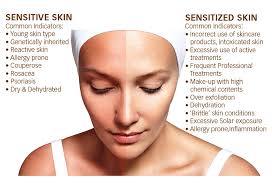
Sensitive skin is a common skin type that occurs when the outermost layer of the skin is damaged or weakened. This damage can be caused by a variety of factors, including sun exposure, harsh weather, and even using the wrong skin care products.
People with sensitive skin are more likely to develop symptoms such as rosacea and contact dermatitis because their skin reacts.
Best Skincare For Sensitive Skin: The Easiest And Non-Irritating Routine
If you have sensitive skin, you know how difficult it is to find skin care products that won’t irritate your skin. Whether you’re swiping left on a drying cleanser or feeling overwhelmed by a moisturizer that’s too light, it can feel like you’re constantly searching for the right skin care routine for your sensitive skin.

That’s why we’ve created a simple skin care routine you can follow to prevent redness and irritation. From basic steps to popular skin care products for sensitive skin, here’s everything you need to know:
Step 1: Gentle Skin Cleanser
Seriously, if you have sensitive skin type, be careful what you use to cleanse your face. need to do it. . A good cleaning product should:

- It should be free of soaps, dyes, fragrances, and harsh chemicals that can irritate sensitive skin. If you want to incorporate makeup remover into your daily routine, make sure it doesn’t contain alcohol.
- Second, it needs to be gentle enough to be used every day without stripping your skin of its natural oils.
- And finally, it should contain ingredients that help soothe and protect the skin, such as centella asiatica, chamomile, and tea extracts.
Here are my must-have cleansers for sensitive skin that can tick all the boxes and provide gentle cleansing.
- Calendula Complete Cleansing Oil – One bottle is enough for everything.
- Benton Honest Cleansing Foam – Cleans your pores without irritating your skin
Step #2: Toner Skincare For Sensitive Skin
I think of toner like a tall glass of ice water that you apply to your face. Therefore, it needs to be refreshing and effective enough to restore pH without compromising the skin’s barrier function.

When it comes to toners, you should look for skin care products that are alcohol-free and free of strong astringents that can irritate the skin. Here are my top picks:
- Rosewater Galactomyces Toner – Even a rose is red and gentle
- Hydriium Watery Toner – The hydrating toner your skin needs
Step #3: Serum Skincare For Sensitive Skin
This is the first step is. Calm skin!

A suitable serum for sensitive skin should contain natural antioxidants such as vitamin C to soothe and protect the skin. It also has anti-inflammatory properties that reduce redness and inflammation.
Additionally, moisturizers and barrier repair agents such as hyaluronic acid should be included to protect the skin from further damage. Combine these three to create a serum that’s gentle enough for even the most sensitive skin types.
Our excellent serums that tick all the boxes to be perfect are:
- Tea Tree Relief Serum – Soothes and soothes irritated skin
- Propolis Vitamin Synergy Serum – K -Get the glow of a POP star
Step 4: Moisturizer Skincare For Sensitive Skin
Moisturizer is an essential part of skin care, but if you have sensitive skin, it can be difficult to manage your moisturizer.
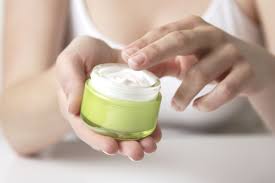
The good news is that there are some key ingredients that can help soothe and protect sensitive skin while restoring your skin’s moisture barrier. First, choose a moisturizer that doesn’t contain fragrances or harsh chemicals. This will help prevent irritation and inflammation.
Next, look for moisturizers that contain ingredients known for their soothing properties, such as aloe vera, shea butter, or the herb chamomile. Finally, be sure to choose non-comedogenic products. This means that if you have eczema-prone skin, it won’t clog your pores and cause further damage.
Looking for a good moisturizer to prevent dry skin? Here are my favorites:
- CENTELLA CALMING GEL CREAM – No more dry skin.
- Advanced Snail 92 All-in-One Cream – Repairs and regenerates the skin barrier
The Myths Of All-Natural Skin Care – Skin Care For Sensitive Skin
I will be 35 years old this year. It’s no exaggeration to say that my skin care needs have changed over the last 10 years since I started this blog at the age of 24. I’ve been sharing some of my favorite skin care products. But today I would like to detail all the products I use for sensitive skin.

Like most people in their 30s, my skin is starting to show signs of aging.
I have fine lines around my eyes and neck, significant loss of elasticity around my eyelids, and an increase in skin tags.
I also have reactive, sensitive skin that cannot tolerate certain ingredients in sunscreens, strong fragrances, or regenerating acids (such as those found in chemical peels).
Should I Use Natural Skincare For Sensitive Skin?
For many years, I have believed that I should only use “all-natural” skin care. These products are designed to be safer for your skin and better for the planet. But the market for natural ingredients is largely unregulated. Many brands that claim to be all-natural use poor formulations that can cause serious reactions and safety risks. For example, some natural products claim to be preservative-free. However, water-based products harbor dangerous bacteria when formulated without preservatives.
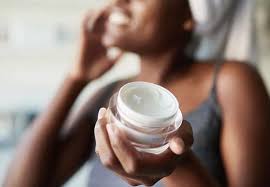
A few years ago, Herbivore’s face cream was recalled for this very reason after mold was discovered in the product. In fact, mold is a common problem for brands that claim to use natural ingredients.
Other natural brands contain reactive ingredients or are not PH balanced in skin care, causing chemical burns. Be careful with products containing essential oils. These can cause allergic reactions and skin rashes if the product is not properly formulated.
Should I Avoid Chemical Sunscreens?
There is a repeated myth that chemical sunscreens kill coral reefs. However, the research is incomplete.
Initially, testing of certain sunscreen ingredients was conducted in the laboratory at concentrations much higher than those found in the environment. Second, not all chemical sunscreens have been identified as posing a high risk of negative environmental impact.
Cosmetic scientist Lab Muffin Beauty points out that most FDA-approved sunscreens are safe to use. She also claims that many “physical sunscreens” containing zinc oxide and titanium dioxide actually have chemical sunscreens in their ingredient list.
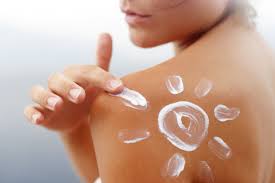
This is because physical sunscreens are often less effective than chemical sunscreens. It also leaves a residue on the skin’s surface called a “white float” that doesn’t mix well.
But that doesn’t mean you should automatically switch to chemical sunscreens. Chemical sunscreens such as oxybenzone are known to cause dermatitis in some people (read, read me). You may need to experiment with formulas to find what works best for you.
Whatever you do, don’t trust the EWG (Environmental Working Group). EWG’s rating system, and even basic ingredient information, is consistently found to be inaccurate by industry experts.
Skin Reactions To Chemical Peels And Active Ingredients
Of course, everyone’s skin is different. Even if you avoid lesser-known “all-natural” brands, your skin may still react.
Chemical peels such as lactic acid, glycolic acid, and retinol/retinoids effectively smooth the skin and reduce signs of aging and skin damage. However, it should be used sparingly as it can disrupt the skin barrier and cause serious irritation.
Start slowly with skin care “ingredients” and see if your skin can handle them.
My Skin Care Concerns
My current skin care concerns are as follows.
- Dryness of the cheeks and body
- Skin sensitivity
- Fine lines, especially around the eyes
- Sun damage
List all the products I use – day, night and weekly I use these products I’ll explain how I’m using it. I hope this gives you some ideas for your own routine.
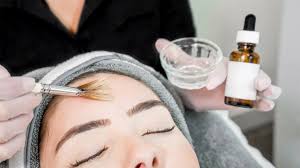
I link almost exclusively to Target because, in my opinion, Target offers the best selection of affordable skin care products suitable for sensitive skin. And many of these products are also sold in stores.
Or do you know of a product that might be a better fit for me?
AM Skin Care Routine
Cetaphil Gentle Skin Cleanser: This cleanser is a classic and for a reason, it’s the gentlest cleanser I’ve ever tried. However, it doesn’t remove makeup very well, so I only use it in the morning.

Cetaphil Moisturizing Lotion: Perfect for total body hydration. It is fragrance-free and has a perfect texture that is neither too thin nor too thick.
Sunscreen (Use Sparingly): I go back and forth between Elta MD UV Clear and Babo Botanicals mineral sunscreen because I’m allergic to chemical sunscreens and even physical sunscreens irritate me. Apply sunscreen only if you know you’ll be driving or going outside for more than a few minutes. (I always wear a brimmed hat when I’m outside.)
PM Skin Care Routine
CeraVe Hydrating Cream To Foam Cleanser: This is amazing. Gently and effectively removes makeup and sticky mineral sunscreen. It is most effective when massaged into the skin for at least 30 seconds.
Neutrogena Acne Stress Control Toner (Except When Using Differin): A super gentle toner with salicylic acid to eliminate small bumps on the forehead, nose, and chin. The smell is a concern, but it didn’t bother me.
Bybi Bakuchiol Booster Serum, Mixed into Lotion: Bakuchiol still needs a little more research, but it is a botanical alternative to retinol that some people find less irritating (some find more irritating). Luckily, it worked well for me and the texture of this serum is lovely.

Cetaphil Moisturizer: I love this. I started doing this when I lived in Connecticut. Because during the winter, thin lotions were not effective. I’m in Houston right now and air pollution and dryness are a problem with the air conditioner on all the time, so it’s still a good choice.
Applying Vaseline Around The Eyes, lips, And Tattoos: Following the advice of a beauty vlogger, I started using Vaseline again. As it is a by-product of the oil industry, we are not too concerned about its sustainability at this point. Forms a very good moisture barrier in areas that need more attention.
Weekly Skincare For Sensitive Skin
Differin Adapalene Gel On Face And Neck Twice Weekly: Differin is marketed for acne, but it is also effective against aging. I use this treatment about twice a week to avoid irritation and immediately notice that my skin is smoother and softer when I wake up in the morning. I’m not sure how well it will reduce fine lines, but it’s a very good product.
Monthly Skincare For Sensitive Skin
Province Apothecary Regenerating Mask/Exfoliant (If Needed): This seems so simple, but my skin feels better after using it. And it does not cause irritation.
Are Skincare For Sensitive Skin Treatments Effective?

Sensitive skin treatments can be effective, but it’s important to approach them correctly. If you suffer from sensitive skin, it’s important to consult a dermatologist or skin care professional. Clinically allows you to schedule an online consultation with a dermatologist. We can help identify the cause of your sensitive skin and recommend the best treatment options for your specific needs. With the right treatment plan, you can enjoy healthier, more comfortable skin and relieve inflammation and redness.
Identify The Root Cause Of Skin Sensitivity
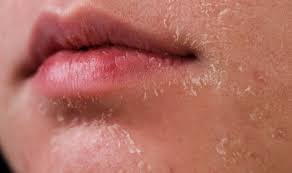
Identifying the root cause of skin sensitivity requires consideration of the many factors that can contribute to or cause a hypersensitivity reaction. Common factors and approaches to identifying root causes include:
- Environmental Factors: Examines exposure to extreme weather conditions such as heat, wind, and sun. Consider whether changes in climate or allergens in the environment are contributing to skin sensitivity.
- Skin Care Products: Check the ingredient list of your skin care products. Harsh chemicals, perfumes, preservatives, and allergens can all cause sensitivities. Consider purchasing fragrance-free or hypoallergenic products.
- Allergies: Find out if you have any known allergies to certain ingredients, fragrances, metals, or substances in your skin care products. Skin sensitivity, redness, itching, and swelling are symptoms of an allergic reaction.
- Underlying Skin Conditions: Consult a dermatologist to rule out or treat underlying skin conditions that may cause increased skin sensitivity, such as eczema, rosacea, psoriasis, and contact dermatitis. please.
- Diet And Nutrition: Consider whether nutritional issues such as food allergies or sensitivities are affecting your skin health. Certain dietary or nutrient deficiencies can cause skin reactions in some people.
- Hormonal Changes: See if skin sensitivity is related to hormonal changes such as puberty, menstruation, pregnancy, and menopause. Hormonal fluctuations can affect skin diseases.
- Stress And Lifestyle Factors: High stress, lack of sleep, and improper lifestyle can worsen skin sensitivity. Manage stress by using relaxation techniques and getting enough sleep.
- Medications: Some medications can cause skin sensitivity as a side effect. If you feel that your medication is causing skin problems, talk to your doctor about possible alternatives.
- Occupational Exposure: Consider whether your job requires exposure to irritants or allergens. In certain professions, such as medicine and cosmetology, occupational stress can cause skin sensitivity.
- Genetic Predisposition: Determine if sensitive skin or skin conditions run in your family. Genetic factors can influence an individual’s skin characteristics.
- Microbiome Imbalance: Research has shown that an imbalance in the skin’s microbiome can cause skin problems. For example, excessive use of antibacterial agents and antibiotics can upset the natural balance.
- Patch Testing: Dermatologists often use patch testing to identify specific allergens that may cause skin sensitivity. A small amount of the potential allergen is applied to the skin to monitor for a reaction.
Keep a skincare notebook to track changes in your daily routine and record instances of sensitivity. If you are unable to identify the cause on your own, seek professional help from a dermatologist. It allows you to test your skin, analyze it, and make personalized recommendations based on your individual needs and sensibilities.
Efficacy Evaluation Of Sensitive Skin Treatment
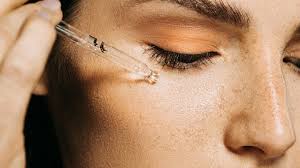
The success of sensitive skin treatment is evaluated using a combination of subjective and objective criteria. Because sensitive skin has many different causes and triggers, the success rate of treatment varies from person to person. Here’s how to evaluate the effectiveness of sensitive skin treatments:
- Subjective Rating: Considers how comfortable it feels on your skin. Has the itching, burning, or pressure decreased? Check to see if the appearance of redness, inflammation, or rash has decreased. Notice the improvement in skin hydration. Effective treatments are aimed at maintaining or restoring the skin’s moisture balance.
- Monitor Changes Over Time: Please allow enough time for the treatment to take effect. Skin problems often take time to improve, and results may not appear immediately. Track improvements over weeks or months to determine long-term effectiveness.
- Product Compatibility: Check how well your treatment products tolerate your skin. If your treatment includes skin care products, keep an eye out for any negative reactions or if your skin becomes more tolerant of them over time.
- Consistent Care: It is important to follow your prescribed skin care routine or treatment plan. The effectiveness of treatments for sensitive skin can be influenced by consistency of application and adherence to recommended schedules.
- Professional Consultation: Schedule a follow-up consultation with your dermatologist or skin care specialist to discuss your progress and make any necessary changes to your treatment plan.
- Patch Test Results: If you use a patch test to identify certain allergens, consider whether avoiding these allergens will reduce skin irritation.
- Changes In Lifestyle Factors: If lifestyle changes are suggested (e.g., reducing stress, improving sleep, changing diet), consider whether these changes are having a positive impact on skin sensitivity. please.
- Photographic Records: Photographs will be taken before treatment begins and periodically after treatment begins. This graphical document helps paint a clearer picture of how skin condition changes over time.
- Feedback From Others: If others notice an improvement in your skin, this may be additional evidence of the effectiveness of the treatment.
- Objective Measurements: Under certain circumstances, dermatologists may use objective measurements to analyze physical changes in the skin, such as: B. Assessment of skin moisture, measurement of transepidermal water loss (TEWL), or special imaging procedures.
- Adjust Your Treatment Plan: If your symptoms do not improve or get worse, consult your dermatologist to make any necessary changes to your treatment plan. This may include trying different products, adjusting dosage, or considering alternative techniques.
Due to the personal nature of sensitive skin, a method that works for one person may not work for another. It’s important to speak openly with your doctor or dermatologist, express your concerns and changes, and work together to determine the most effective treatment plan for your individual skin needs.
Please Do The Following: Incorporate The Calming Ingredient

People with sensitive skin may benefit from incorporating soothing substances into their skin care routine. These compounds help minimize redness, soothe irritation, and improve overall skin comfort. Consider the following relaxing ingredients.
- Aloe Vera:
Known for its anti-inflammatory and cooling properties, Aloe Vera helps soothe and moisturize sensitive skin. Look for products that contain pure aloe vera or aloe vera gel.
- Chamomile:
Chamomile has anti-inflammatory and antioxidant properties. Products containing chamomile oil or extracts can help soothe and soothe sensitive skin.
- Cucumber Extract:
The cooling and moisturizing properties of cucumber are well known. Cucumber extract products are particularly effective at revitalizing and soothing irritated skin.
- Calendula:
Calendula extract, derived from marigold flowers, is often used for its anti-inflammatory properties. It can be used to soothe sensitive or irritated skin.
- Green Tea Extract:
Green tea has anti-inflammatory and antioxidant properties. Green tea extract protects the skin from environmental influences while reducing inflammation.
- Colloidal Oatmeal:
Colloidal oatmeal is made from finely ground oatmeal that is cooked to extract nutrients. It contains anti-inflammatory properties and helps relieve itchy and inflamed skin.
- Licorice Extract:
Licorice extract has anti-inflammatory and soothing properties for the skin. Helps reduce redness and inflammation.
- Bisabolol:
Bisabolol, obtained from chamomile, has anti-inflammatory and skin soothing properties.
- Allantoin:
Allantoin is a botanical compound found in plants such as comfrey. Promotes healing and minimizes inflammation while soothing and protecting the skin.
- Hyaluronic Acid:
Although hyaluronic acid is not generally thought of as a soothing ingredient, it is excellent at moisturizing the skin. Well-hydrated skin is less susceptible to irritation, so adding moisturizing substances such as hyaluronic acid can indirectly soothe the skin.
- Centella Asiatica (Deer):
Known as deer or tiger grass, Centella asiatica has anti-inflammatory properties and is often used to soothe sensitive or irritated skin.
When incorporating calming elements into your skin care routine, it’s important to test new products to ensure they don’t cause any unpleasant reactions. Consider using products with fewer ingredients and avoiding potential irritants such as fragrances and alcohol. Remember that everyone’s skin reacts differently to skin care products. Therefore, pay attention to your skin reactions and see a dermatologist if you have specific concerns or if sensitivity issues recur.
Skincare For Sensitive Skin Routine For Dry Sensitive Skin

Dry, sensitive skin is especially difficult to care for because it is easily irritated and requires additional moisture. Here are some skin care tips for dry and sensitive skin.
- Remove dirt, oil and makeup from your skin with this mild, non-foaming cleanser for dry, sensitive skin. Avoid using boiling water, which can strip your skin of its natural oils, and choose lukewarm water instead.
- After cleansing, use a toner to balance your skin’s pH and prepare it for the next step in your skin care routine. Avoid toners that contain alcohol, as they can dry out and irritate sensitive skin.
- Apply moisturizer to your skin to hydrate and protect it. Look for moisturizers for sensitive skin that contain ingredients like ceramides, hyaluronic acid, and glycerin to lock in moisture.
- Add extra moisture and nourishment to your skin with a facial oil or hydrating skin serum. Oils and serums penetrate deeper into the skin than moisturizers, providing long-lasting hydration and improving overall skin health.
- Protect your skin from the sun with a broad-spectrum sunscreen for sensitive skin with SPF 30 or higher. Sensitive skin is more susceptible to sun damage. Therefore, it is important to use sunscreen daily to prevent sunburn and other damage.
Remember that consistency is key and finding the right products for your skin can take time. If you have recurring problems or extreme sensitivity, you should seek individual advice from your dermatologist.
Establish Daily Habits For Hydration And Protection

Establishing a daily skin care routine that focuses on hydration and protection is critical to maintaining healthy and elastic skin, especially if you have sensitive or irritated skin. Here’s a step-by-step guide to creating a daily skin care routine that both moisturizes and protects.
Morning Routine:
- Cleanser: In the morning, wash your face with a light moisturizing cleanser. Choose a sulfate-free solution that won’t strip your skin of its natural oils.
- Toner: Use a soothing alcohol-free toner to balance your skin’s pH. Look for toners that contain chamomile, rose water, or aloe vera.
- Serum: Add a hydrating serum with ingredients like hyaluronic acid, glycerin, and vitamin B5. These ingredients help your skin retain moisture and stay hydrated throughout the day.
- Moisturizer: To lock in moisture, use a lightweight, non-comedogenic moisturizer. Look for products that contain ceramides, which help maintain the skin’s barrier.
- Sunscreen: Apply a broad-spectrum sunscreen with at least SPF 30 every morning, even on cloudy days. Sunscreen is essential to prevent aging and protect your skin from damage caused by UV rays.
Tip Of The Day:
- Reapply sunscreen: If you’re outdoors for long periods of time, reapply sunscreen at least every two hours if you sweat or swim.
- Protective clothing: Wear a wide-brimmed hat and sunglasses for additional sun protection.
Nighttime Routine:
- Cleanser: Use the same gentle cleanser you used in the morning to remove makeup, sunscreen, and impurities.
- Toner: Reapply toner after cleansing to restore balance to your skin.
- Treatment (If Needed): Apply a treatment product, such as a retinoid or acne medication, in the evening as directed by your dermatologist.
- Moisturizer: Reapply moisturizer to your skin to nourish and hydrate it.
Weekly Or Biweekly Treatments:
- Peels: Use a mild chemical peel (AHA or BHA) once or twice a week to remove dead skin cells and promote skin regeneration. If you have sensitive skin, avoid using physical exfoliants.
- Mask (Optional): Apply a moisturizing or soothing mask if desired. Ingredients such as aloe vera, chamomile, and hyaluronic acid can help.
Additional Tips:
- Stay Hydrated: Drink plenty of water throughout the day to keep your skin and body hydrated.
- Avoid Using Hot Water: Use lukewarm water for cleansing, as hot water can strip your skin of its natural oils and increase sensitivity.
- Patch Test New Products: Test new products before incorporating them into your daily routine to ensure they do not cause irritation or allergies.
- Consult A Dermatologist: If you have a specific skin problem or disease, seek personalized advice from a dermatologist.
This routine should be tailored to your skin’s specific needs and sensitivities. It’s important to stick to your routine and monitor how your skin reacts over time. You can adjust it according to changes in season, lifestyle, and skin condition.
Soothe Skincare For Sensitive Skin With Science!
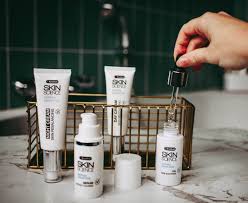
Conclusion: Skin care for sensitive skin can be difficult, but with the right approach and knowledge, it is possible to effectively care for sensitive skin and keep it healthy and happy. Avoid harsh products and choose gentle, non-foaming cleansers, toners, and moisturizers designed specifically for sensitive skin. Protect your skin from the sun with a broad-spectrum sunscreen, and add extra hydration and nourishment with a facial oil or serum. By following these tips and using the best skin care products for sensitive skin, you can keep your skin looking and feeling its best.
Understanding The Science Behind Skincare For Sensitive Skin

Skin sensitivity is the ease with which the skin reacts to various stimuli, such as external influences, skin care products, and internal problems. The skin is the largest organ in the body and acts as a barrier between internal organs and the external environment.
The following are some important factors that contribute to skin sensitivity:
- Skin Barrier Function: The outermost layer of the skin, the stratum corneum, acts as a barrier, preventing water loss and protecting against external irritants. Masu. Dryness, dehydration and a damaged skin barrier make the skin more susceptible to irritation.
- Nerve Endings And Sensory Perception: Sensory nerve endings in the skin respond to a variety of stimuli, including temperature, pressure and chemicals. People with sensitive skin have more nerve endings or increased sensations, making them more susceptible to discomfort and irritation.
- Inflammatory Response: Skin hypersensitivity is often accompanied by an inflammatory response. When an irritant or allergen comes into contact with the skin, the immune system releases inflammatory mediators that can cause redness, itching and swelling. Chronic inflammation can make your skin more sensitive over time.
- Genetic Factors: Genetics influence skin sensitivity. Variations in genes related to skin structure, barrier function, and immune response can make the skin more sensitive in some people.
- Environmental Factors: Exposure to harsh weather conditions (high temperatures, wind, sunlight), pollution, and allergens can increase skin sensitivity. In addition, contact with certain substances, substances and chemicals can cause reactions in sensitive people.
- Skin Diseases: Skin diseases such as eczema, rosacea, and psoriasis are associated with increased skin sensitivity. These disruptions can weaken the skin barrier and cause an inflammatory response.
- Hormonal Changes: Hormonal fluctuations can affect skin sensitivity, especially in women. Hormonal fluctuations during puberty, menstruation, pregnancy, and menopause can affect how your skin responds to various stimuli.
- Skin Care Products: Using skin care products that contain harsh chemicals, fragrances, or preservatives can worsen skin sensitivity. People with sensitive skin may need to use cosmetics specifically formulated for their skin type.
Skincare For Sensitive Skin Understanding the science of skin sensitivity requires consideration of these many factors and their interactions. People with sensitive skin should follow a skin care routine that focuses on maintaining the skin barrier, avoiding irritants, and treating specific skin conditions. A dermatologist can provide personalized advice based on your unique skin characteristics and sensitivities.
